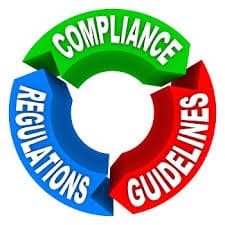FTA Drug and Alcohol Policy Requirements Checklist
FTA requires each employer to establish a policy that defines its Drug and Alcohol Testing Program, and requires the entity’s governing body to formally adopt the policy.
Designated contact person, board adoption ·•Identity of the person, office, branch or position designated by the employer to answer employee questions about the anti-drug and alcohol misuse prevention program
•Approval/adoption by the local governing board of the employer or operator, or other responsible individuals with appropriate authority
Covered Employees
•Operation of a revenue service vehicle, in or out of revenue service
•Maintaining a revenue service vehicle or equipment used in revenue service
•Controlling dispatch/movement of a revenue service vehicle (determined by employer)
•Operation of a non-revenue vehicle requiring a CDL
•Volunteers:
- Must have CDL to drive vehicle, or
- Remunerated for service in excess of costs incurred
•Carrying a firearm for security purposes
*The policy must include a list of the actual positions/categories covered at your company
Prohibited Substances
•Marijuana
•Cocaine
•Amphetamines
•Opiates
•Phencyclidine
•Alcohol
Prohibited behavior
•Use of illegal drugs prohibited at all times
•Alcohol use prohibited 4 hours prior to performing safety-sensitive functions, while on call, and while performing safety-sensitive functions
•Alcohol use prohibited 8 hours after accident or until Post Accident test is performed
•Employees are prohibited from performing safety-sensitive functions while having an alcohol concentration of 0.04 or greater
Pre-employment
•Negative test before 1st safety-sensitive duty, must be made up if canceled
•If out of safety-sensitive duty for 90+ days, and out of random testing pool, emp needs DOT pre-employment test with negative result prior to returning to covered duty
•Applicant who previously failed/refused a DOT test must show evidence of treatment
•If employer chooses to require alcohol test:
- pre- SS duty,
- all covered employees
- after offer of employment/transfer
- must follow Part 40 regulations
- BAC < 0.02
Random
•Scientifically valid selection method
•Equal chance of selection on each draw
•No discretion on the part of management/supervisors
•Testing is conducted on all days and hours throughout the year
•Unannounced and immediate
•Alcohol testing only permissible just before/ during/just after actual performance of safety-sensitive functions
Post-accident
FTA Thresholds:
- Fatality
- Medical treatment away from scene, unless driver discounted
- Disabling damage, unless driver discounted
- All other covered employees whose performance could have contributed to the accident
- Readily available (or considered a refusal to test)
- Readily available (testing is stayed while employee assists in resolution of the accident or receives medical attention following the accident)
Reasonable suspicion
•Trained supervisor
•Physical signs & symptoms, contemporaneous observation
•Alcohol testing only permissible just before/during/just after SS duty
Return-to-duty and Follow-up
•Conducted in accordance with Part 40, subpart O
•All tests conducted under direct observation
•Follow-up alcohol testing only permissible just before/ during/just after actual performance of safety-sensitive functions
Procedures
•Policy states all FTA-required testing conducted in accordance w/ 49 CFR Part 40
Requirement to Submit
•All covered employees are required to submit to drug and alcohol tests as a condition of employment in accordance with 49 CFR Part 655
Period of Coverage
•Drug test – anytime on while on duty
•Alcohol test (random, reasonable suspicion, and follow-up) – Just before, during, or immediately after actual performance of safety-sensitive functions
Test Refusal
•Failure to remain until the testing process is complete
•Failure to attempt to provide a breath or urine specimen
•Failure to provide a sufficient quantity of urine or breath without a valid medical explanation
•Failure to undergo a medical evaluation as required by the MRO or DER
•Failure to cooperate with any part of the testing process
•Failure to permit an observed or monitored collection when required
•Failure to follow an observer’s instructions to raise and lower clothing and turn around (observed)
•Possessing or wearing a prosthetic or other device used to tamper with the testing process
•Failure to take a second test when required
•Admitting the adulteration or substitution of a specimen to the collector or MRO
•MRO verified adulterated/substituted sample
•Refusal to sign Step 2 of alcohol test form
•Failing to appear within a reasonable time
*For pre-employment, NOT a refusal: Failure to appear, failure to remain at site prior to start of test, aborting collection before test commences
Consequences
•Positive drug or alcohol (above 0.04) test result or test refusal (SAP Referral Required)
•BAC in range of 0.02 to 0.039 (remove employee from safety-sensitive position- apply transit system disciplinary policy if applicable; DOT SAP referral prohibited)
•Dilute negative: must have fixed policy to retest or not retest (though policy may differ between test types)
Additional Employer Provisions Allowed
•Policy delineates between FTA and company policy prohibitions, terms, etc.
•The provisions of the Drug Free Workplace Act of 1988 may be incorporated in the policy statement but must be so identified
Compliance Tips
•Effective date of policy-normally found on cover of policy
•Policy distribution -Employees should be requested to sign a confirmation of receipt form
•Make sure future revisions of a substantive nature also receive Board approval
•Make sure all employees have the most current version of the policy
•Clearly differentiate between FTA and company authority







